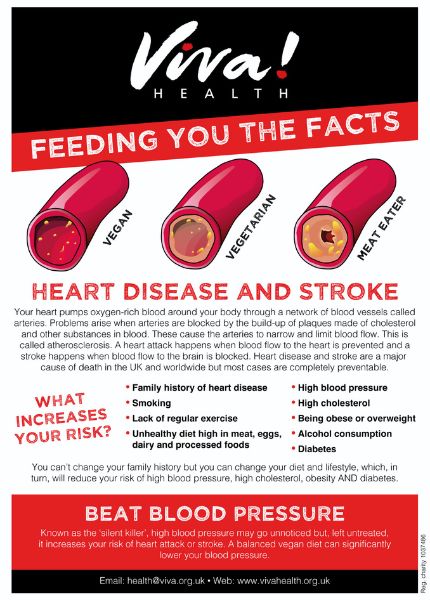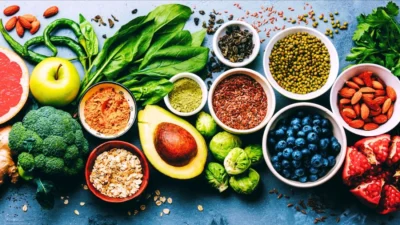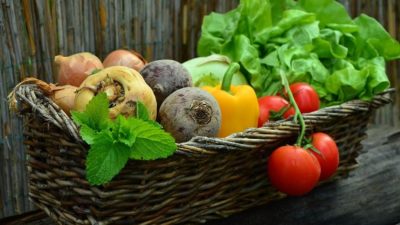Mini factsheet: Heart health

A vegan diet helps protect your heart health
Your heart pumps oxygen-rich blood around your body through a network of blood vessels called arteries. Problems arise when arteries are blocked by the build-up of plaques made of cholesterol and other substances in blood. These cause the arteries to narrow and limit blood flow. This is called atherosclerosis. A heart attack happens when blood flow to the heart is prevented and a stroke happens when blood flow to the brain is blocked. Heart disease and stroke are a major cause of death in the UK and worldwide but most cases are completely preventable.
What increases your risk?
- Family history of heart disease
- Smoking
- Lack of regular exercise
- Unhealthy diet high in meat, eggs, dairy and processed foods
- High blood pressure
- High cholesterol
- Being obese or overweight
- Alcohol consumption
- Diabetes
You can’t change your family history but you can change your diet and lifestyle, which, in turn, will reduce your risk of high blood pressure, high cholesterol, obesity AND diabetes.
Beat blood pressure
Known as the ‘silent killer’, high blood pressure may go unnoticed but, left untreated, it increases your risk of heart attack or stroke. A balanced vegan diet can significantly lower your blood pressure.
Combat cholesterol
Cholesterol is only found in animal foods – high levels in eggs, liver, kidneys and prawns. Plant foods (including nuts and avocados) contain none. But most of the cholesterol in your blood is produced by your liver. What causes this? Saturated fat! The type found in all types of meat, meat pies, sausages, fatty cuts of meat, bacon, butter, ghee, lard, cream, hard cheese, cakes, biscuits and foods containing coconut and palm oil. To cut your cholesterol, reduce saturated fat and include cholesterol-lowering foods such as oats and soya protein.
High-five to fibre
Eating plenty of fibre helps lower your risk of heart disease. Every day try to include:
- 3-4 portions of cereals and grains (oats, wholemeal bread, wholegrain pasta and brown rice)
- 5 or more portions of fruit and vegetables
- 2-3 portions of pulses (beans, peas, lentils and soya), nuts, nut butters or seeds
A note on nuts
A small palm-sized (30 gram) portion of unsalted nuts or seeds a day can help lower your risk of heart disease without piling on the pounds.
Achieve a healthy weight
Obesity increases your risk of heart disease. A low fat, wholefood vegan diet along with gentle exercise can help you lose weight and maintain a healthy weight.
Omega-3 fats
Essential fats called omega-3s are vital for good health and research shows that those from plant sources (unlike fish oil), can also help protect your heart. The best sources include ground flaxseed or flaxseed oil, chia seeds, hemp seed, walnuts or rapeseed oil.
Why is a vegan diet the best for the heart?
A wholefood vegan diet helps to save lives because it’s naturally low in saturated fat and devoid of cholesterol and, at the same time, it’s high in fibre, healthy carbohydrates, unsaturated fats and quality protein. It contains a wealth of antioxidants and other beneficial compounds that protect your blood vessels and it supports good gut bacteria, which are also linked to heart health.
Changing your diet can help prevent and reverse heart disease.
This post has been categorised in: All Print Materials, Mini factsheets







